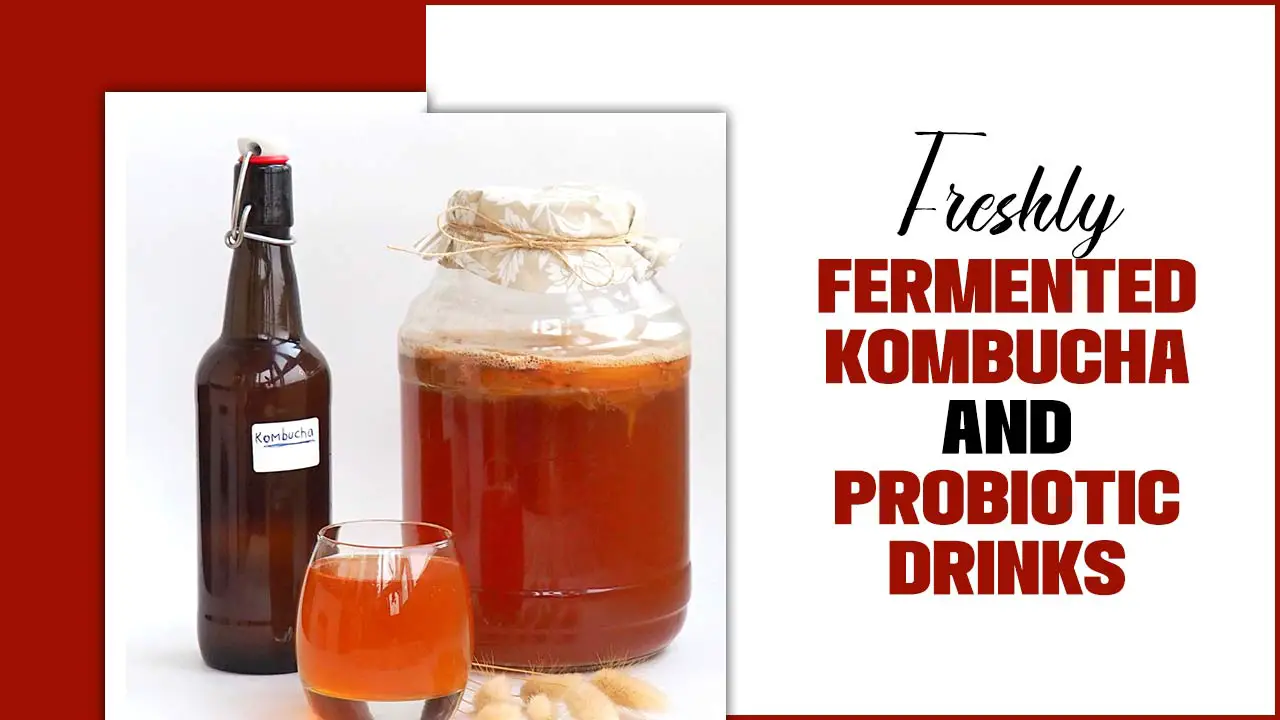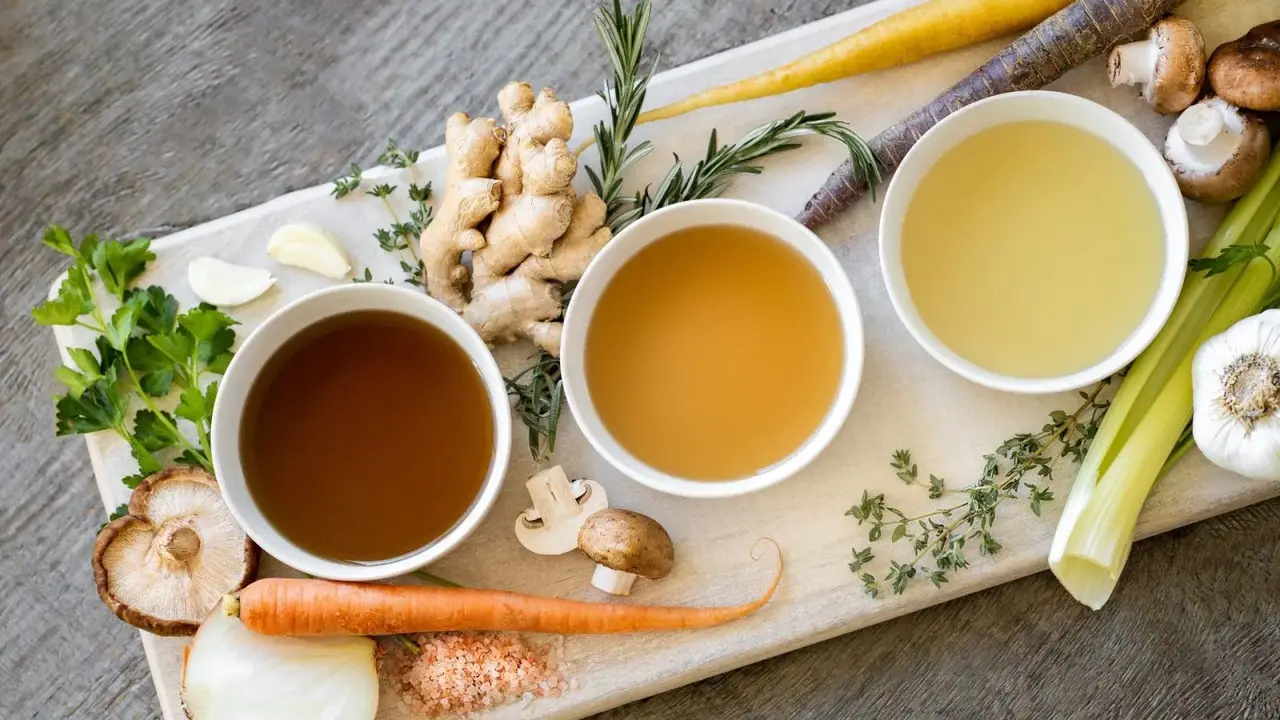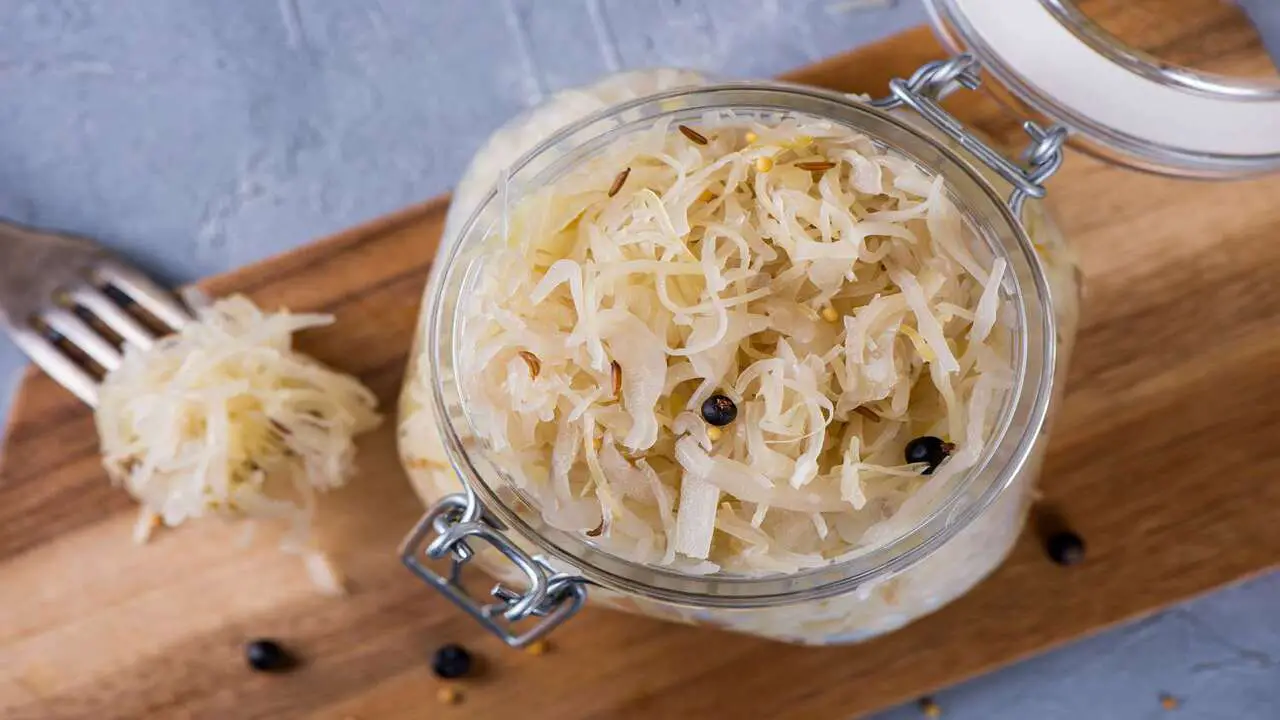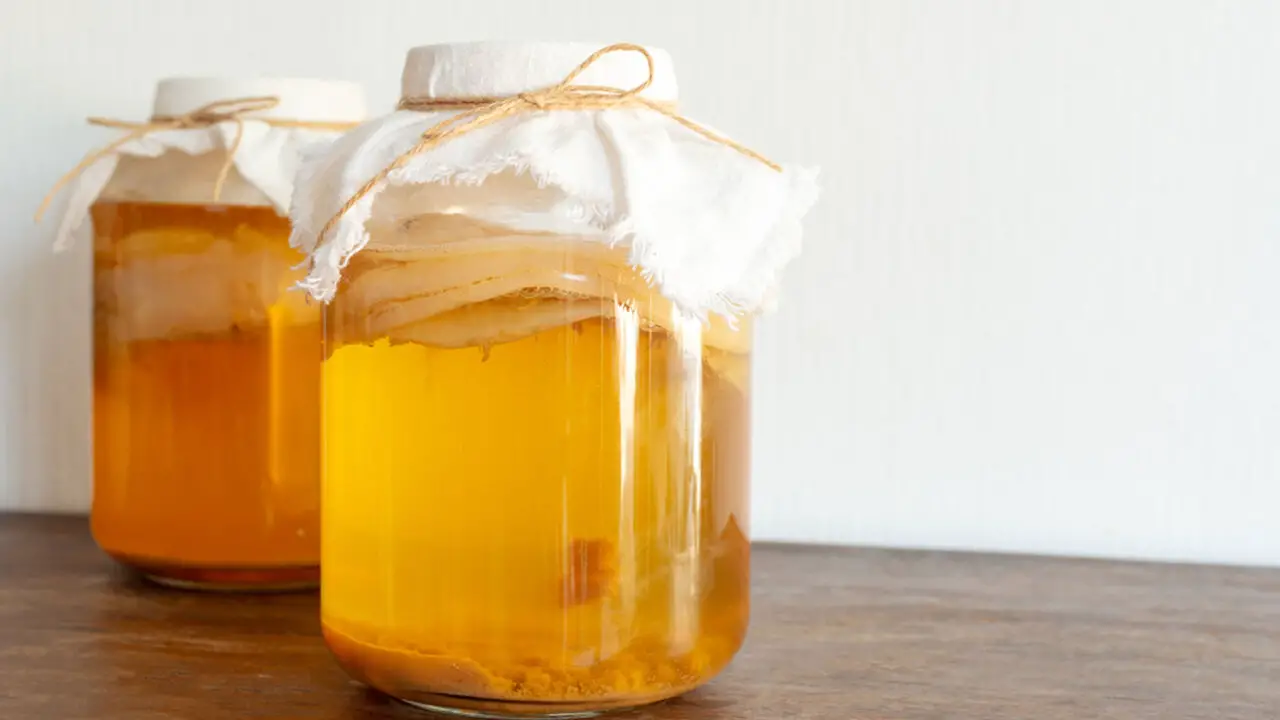Kombucha is a type of fermented tea that has gained popularity in recent years due to its potential health benefits. A SCOBY, a symbiotic culture of bacteria and yeast, ferments sweetened tea to make it.
During the fermentation process, the SCOBY consumes the sugar in the tea and produces various acids, enzymes, and probiotics. Are you looking for a refreshing and healthy alternative to sugary drinks? Look no further than freshly fermented kombucha and probiotic drinks. These tangy and fizzy beverages not only quench your thirst but also provide a host of health benefits.
Here we’ll dive into kombucha and probiotic drinks, exploring their origins, the fermentation process, and the potential impact they can have on your gut health. So grab a glass and embark on a delicious journey towards better digestion and overall wellness.

Freshly Fermented Kombucha And Probiotic Drinks To Try For Better Gut Health

It has gained popularity recently due to its numerous health benefits and unique flavor profile. This fermented tea beverage introduces beneficial bacteria into the digestive system, which can improve gut health, and is known for its probiotic properties. Additionally, kombucha is rich in antioxidants, which help to combat inflammation and oxidative stress in the body.
Its tangy and slightly effervescent taste appeals to those seeking a refreshing alternative to sugary sodas and juices. With its rising popularity, kombucha can now be found in various flavors, making it a versatile and enjoyable beverage option for many people. You can try some of the best Fresh Fermented Kombucha and Probiotic Drinks for better gut health.
Kombucha
Kombucha drinks have gained popularity recently for their potential health benefits and delicious taste. It is a fermented tea beverage that adds a symbiotic culture of bacteria and yeast (SCOBY) to sweetened tea.
During fermentation, the SCOBY consumes the sugar and produces probiotics, organic acids, and other beneficial compounds. These probiotics can support gut health by promoting the growth of healthy bacteria in the digestive system.
Those looking for a flavorful alternative to sugary sodas or juices often choose kombucha because of its refreshing and tangy flavor profile. So, if you want to add some fizz and gut-friendly goodness to your beverage routine, try kombucha.
Sauerkraut

People know sauerkraut for its tangy flavor and numerous health benefits, as it is a popular fermented food. Made from fermented cabbage, sauerkraut is rich in beneficial bacteria, which can help to support a healthy gut microbiome.
These beneficial bacteria, also known as probiotics, can aid in digestion, boost the immune system, and improve overall gut health. Additionally, sauerkraut is also a good source of vitamins C and K, as well as fiber. It can enjoy on its own or added to salads, sandwiches, or even as a topping for hot dogs.
Fermented Vegetables
Fermented vegetables are a great addition to any diet focused on improving gut health. Not only do they provide a rich source of beneficial probiotics, but they also offer an array of vitamins and minerals that can support overall wellness. Popular options include sauerkraut, kimchi, and pickles.
These fermented vegetables undergo a natural fermentation process that enhances their flavor and nutritional value. Incorporating these tangy treats into your meals can help promote a healthy gut microbiome and support digestion.
Miso Soup

Miso soup is a delicious and nutritious fermented food that can be beneficial for gut health. People mix the miso paste with water to create a flavorful broth, often enjoyed as a traditional Japanese dish.
The fermentation process involved in making miso soup helps increase the levels of beneficial bacteria, known as probiotics, which can support a healthy gut flora balance.
These probiotics can help improve digestion and nutrient absorption, boost the immune system, and reduce inflammation in the gut. Miso soup is also a good source of vitamins, minerals, and antioxidants, making it a great addition to any diet focused on gut health.
Probiotic Drinks
Probiotic drinks, such as kombucha, have gained popularity recently for their potential benefits to gut health. Beneficial bacteria and yeasts ferment these drinks. The result is a fizzy, tangy beverage that can help support a healthy gut flora balance. Probiotic drinks like kombucha improve digestion, boost the immune system, and promote overall gut health.
They are also a great option for those looking for an alternative to sugary sodas or artificial energy drinks. With a wide variety of flavors and brands available, there is sure to be a probiotic drink that suits your taste preferences and dietary needs.
Gingered Tepache
Gingered Tepache is a delicious and refreshing probiotic drink that can work wonders for your gut health. Made from fermented pineapple rinds, water, sugar, and ginger, this tangy beverage is packed with beneficial bacteria and enzymes that can help promote a healthy digestive system.
The fermentation process breaks down the sugars in the pineapple rinds, creating a fizzy and slightly alcoholic drink that can aid in digestion and improve nutrient absorption. With its unique flavor profile and numerous health benefits, Gingered Tepache is definitely worth a try for anyone looking to improve their gut health.
How To Make Kombucha At Home

Kombucha, a fermented tea beverage, has gained popularity recently due to its potential health benefits. One of the main advantages of kombucha is its probiotic properties. Making kombucha at home is a fun and rewarding way to enjoy this refreshing and probiotic-rich beverage. Here’s a step-by-step guide to help you get started:
- Gather your ingredients: You will need a SCOBY (symbiotic culture of bacteria and yeast), black or green tea, sugar, and filtered water.
- Brew the tea: Bring water to a boil, then remove from heat and add tea bags or loose-leaf tea. Steep for 5-7 minutes, then remove the tea bags or strain the loose leaves.
- Add sugar: Stir in the sugar until it dissolves completely. The sugar provides food for the SCOBY during fermentation.
- Cool the sweetened tea: Allow the tea to cool to room temperature before proceeding.
- Transfer to a fermentation vessel: Pour the cooled sweetened tea into a clean glass jar or fermenting vessel, leaving some space at the top.
- Add the SCOBY: Carefully place the SCOBY on top of the sweetened tea. Make sure your hands are clean and avoid using metal utensils, as they can damage the SCOBY.
- Cover and ferment: Cover the jar with a breathable cloth or coffee filter secured with a rubber band. Place it in a warm spot away from direct sunlight and let it ferment for 7-14 days, depending on your desired taste.
- Test for readiness: After about a week, start tasting your kombucha using a clean straw or spoon. Once it reaches your preferred level of tartness, it’s ready for bottling.
- Bottle and second ferment: Remove the SCOBY and set it aside in a separate container with some of the liquid from your first batch.
Health Benefits Of Kombucha
Kombucha is a fermented tea beverage that has gained popularity in recent years due to its potential health benefits. One of the main advantages of kombucha is its probiotic properties.
Probiotics are live bacteria and yeasts that are beneficial for the digestive system. They can help improve gut health by balancing the levels of good and bad bacteria in the gut, enhancing digestion and nutrient absorption.
Additionally, kombucha is rich in antioxidants, which can help protect the body against oxidative stress and inflammation. Some studies have also suggested that kombucha may have antimicrobial properties and could potentially help boost the immune system.
However, it is important to note that more research is needed to understand the health benefits of kombucha fully, and individuals should consult with their healthcare provider before making any significant changes to their diet or lifestyle.
Risks Of Consuming Kombucha

While freshly fermented kombucha and other probiotic drinks can offer numerous health benefits, it is important to be aware of the potential risks associated with their consumption. One of the main concerns is the possibility of contamination with harmful bacteria or fungi during the fermentation process.
This can occur if proper hygiene practices are not followed or if the fermentation conditions are not properly controlled. Additionally, individuals with compromised immune systems or certain medical conditions may be more susceptible to adverse effects from consuming kombucha.
It is always recommended to purchase commercially produced kombucha from reputable sources and to consult with a healthcare professional before incorporating it into your diet, especially if you have any underlying health concerns.
Conclusion
Incorporating freshly fermented kombucha and probiotic drinks into your diet can positively impact your overall health and well-being. From tangy Kombucha to refreshing probiotic drinks, incorporating freshly fermented beverages into your daily routine can benefit your gut health.
These probiotic-rich drinks are delicious, support digestion, and boost your immune system. Whether you want to improve your gut health or simply enjoy a tasty and refreshing beverage, adding
Fermented kombucha and probiotic drinks to your diet is a great choice. Start exploring the wonderful world of fermentation and experience the amazing flavors and health benefits today. Cheers to a healthier gut.
Frequently Asked Questions
1.Is It OK To Drink Kombucha Every Day?
Ans: Drinking kombucha daily can be a healthy addition to your routine, but it’s important to do so in moderation. It is a fermented drink that contains probiotics, which are beneficial bacteria for your gut health. However, consuming too much kombucha can lead to an imbalance in your gut microbiome or cause digestive issues.
2.Is It OK To Take Probiotics And Drink Kombucha?
Ans: Taking probiotics and drinking kombucha can be a beneficial combination for many individuals. Both probiotics and kombucha contain live bacteria and yeasts that can help promote a healthy gut microbiome. Probiotics support digestion and boost the immune system. Kombucha, a fermented tea with probiotics and antioxidants, contains these beneficial properties.
3.Is It Better To Drink Kombucha Or Take A Probiotic?
Ans: When it comes to improving gut health, both kombucha and probiotics have their benefits. Kombucha is a fermented tea beverage that contains live bacteria and yeast cultures, which can help promote a healthy balance of gut bacteria. On the other hand, probiotics are supplements or foods that contain specific strains of beneficial bacteria.
4.Is A Kombucha Probiotic Drink Good For You?
Ans: It is a fermented probiotic drink that has gained popularity in recent years. But is it actually good for you? The answer is yes! Kombucha contains live bacteria and yeast cultures, which benefit your gut health. These probiotics can help to balance the bacteria in your digestive system and promote overall digestive wellness.
5.What Ingredients Go Into Making Kombucha Cultures?
Ans: The process of making kombucha cultures involves a few key ingredients. The main ingredient is black or green tea, which provides the base for fermentation. Sugar is added to the mixture to feed the beneficial bacteria and yeast that ferment the tea. In addition, a SCOBY (symbiotic culture of bacteria and yeast) is used to initiate fermentation.

I’m a writer and blogger who loves to talk about entertainment, culture, and relationships. I love to share my thoughts and insights on these topics, and I’m always looking for new ways to engage with my readers. I’m also a big fan of learning new things, so I’m always exploring new areas of interest.
